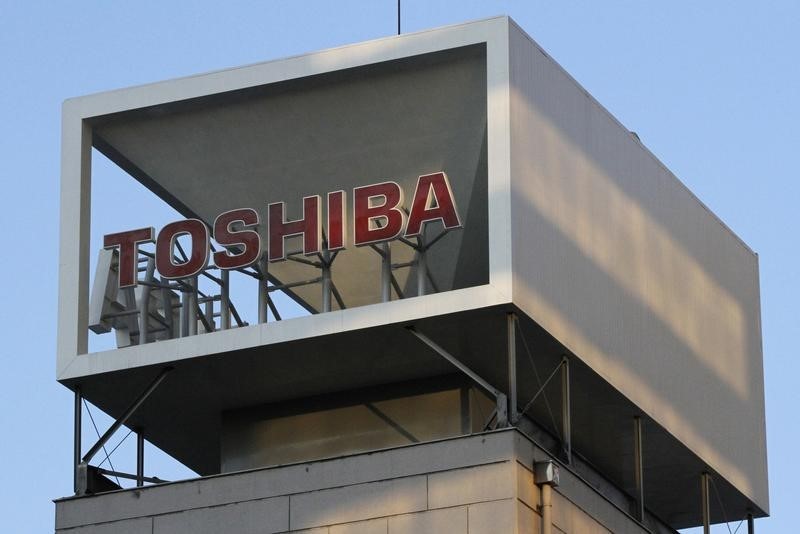* Japan wants to offer Australia package of industrial deals
* Toshiba eyes military, commercial sales of lithium batteries
* South Australia expects to benefit from battery tech, facilities
* Australia to pick submarine design this year (Adds comment from Japan's Ministry of Defence)
By Tim Kelly and Nobuhiro Kubo
TOKYO, March 1 (Reuters) - Japan has enlisted electronics firm Toshiba Corp 6502.T to help it try to win Asia's biggest defence contract, a A$50 billion ($36 billion) deal to build a dozen submarines for Australia, three sources said.
Toshiba is considering building a factory in Australia to make lithium-ion batteries to power the vessels, said the sources who are familiar with the plan but not authorised to talk to the media.
The potential investment, which is contingent on Canberra picking the Japanese design, is part of an incentive package promising commercial and defence sector work beyond the submarine programme, aimed at winning over politicians who want jobs in Australia.
The proposed plant, which could be worth hundreds of millions of dollars, will also fabricate industrial scale power packs for commercial customers around the world, said the sources.
Such an investment could be an attractive proposition for Australia, which is seeking other avenues of growth as it grapples with plunging commodity prices.
"Australia's prime minister (Malcolm Turnbull) is promoting innovation, and that is something Japan can do," said one of the sources.
Australia's submarine industry is based in South Australia, but the sources did not say where Toshiba was considering building a factory.
Toshiba denied it was mulling a new Australian battery plant.
"There is no such a fact, no such a plan," a spokesman said.
A spokesman for Japan's Ministry of Defence said nothing was decided regarding which maker's batteries would be used if its bid was successful.
"If Japan is chosen, then Japan and Australia would consider detailed plans over several years and the first discussion would come from there," the spokesman said.
BOOST FOR SOUTH AUSTRALIA, TOSHIBA
Without commenting on Toshiba's potential involvement, South Australia's Minister for Defence Industries Martin Hamilton-Smith said he expected new facilities associated with battery technology would be based in the state as part of any domestic-build option, regardless of who won the tender.
"This is an example of the impact the Future Submarines project would have across other industry sectors," he told Reuters in an emailed response. "It also underlines the economic effects of a local build and why such effects should be taken into account when the Federal government considers where the submarines will be built."
Australia's Department of Defence did not immediately respond to requests for comment.
The choice of Toshiba to supply the Australian submarine batteries would be a boost for the struggling Japanese industrial conglomerate as it braces for a net loss of 710 billion yen ($6.3 billion) this year following a major accounting scandal.
It was not immediately clear if the plant would build lithium ion battery cells from scratch or be a cheaper, simpler assembly operation, offering fewer jobs and economic benefits.
Toshiba's batteries were picked for the Australian submarine project over those made by GS Yuasa Corp 6674.T because they are easier to maintain, two of the sources said.
GS Yuasa declined to comment, while Japan's Defence Ministry did not immediately respond to requests for comment.
JAPAN'S STRENGTHS
Japan is offering Australia a variant of its 4,000 ton diesel-electric Soryu submarine built by Mitsubishi Heavy Industries 7011.T and Kawasaki Heavy Industries 7012.T , with a lithium-ion underwater propulsion system.
It is up against France's state-owned builder DCNS, which plans to make a conventional version of its 5,000-tonne Barracuda nuclear-powered submarine, and Germany's ThyssenKrupp TKAG.DE (TKMS), which is proposing to scale up its 2,000-ton Type 214 class vessel.
Domestic political considerations, particularly jobs for Australian workers, will also weigh on the final choice.
Japan was initially slow to commit to build all vessels at South Australian shipyards. But sources told Reuters in January the competition was narrowing to a race between Japan and France as TKMS loses ground over concerns about the technical challenges of scaling up the size of its sub. win over Australia, Japan's government is also pushing the strategic value of its design over one from Europe.
The two U.S. allies in Asia are deepening security ties as Washington pushes its defence partners to work more closely together to balance China's rising regional power.
Japan's Minister of Foreign Affairs Fumio Kishida stressed that strategic significance when he met his Australian counterpart Julie Bishop in Tokyo last month.
Defence officials in Tokyo, however, worry their bid is undermined by a dearth of experience managing overseas military projects and a lack of industrial ties in Australia it will need to complete the complex vessels, the sources said.
Until Prime Minister Shinzo Abe ended a decades-old ban on arms exports in 2014, Japanese military equipment makers had only ever sold kit to domestically.
Australia's government has said it will make its submarine pick this year. ($1 = 1.3845 Australian dollars) ($1 = 112.5700 yen)
<^^^^^^^^^^^^^^^^^^^^^^^^^^^^^^^^^^^^^^^^^^^^^^^^^^^^^^^^^^^ Australia's submarine fleet options
http://link.reuters.com/zud43w
^^^^^^^^^^^^^^^^^^^^^^^^^^^^^^^^^^^^^^^^^^^^^^^^^^^^^^^^^^^>
